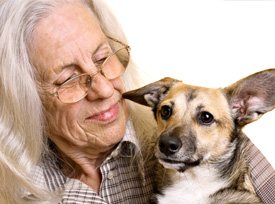Caring for Your Senior Pet

As pets age, they become more susceptible to a variety health issues. Health problems that can affect older pets include arthritis, cancer, heart disease, kidney/urinary tract disease, liver disease, diabetes, joint or bone disease, senility, and weakness. However, with proper care and attention, we can detect these problems sooner and delay their progression. Here are a few tips to help your senior pets live a happy and healthy lifestyle throughout their later years.
Regular Veterinary Examinations
Senior pets should have semi-annual visits to the vet rather than just one annual visit. Regular veterinary examinations can detect issues in older dogs before they become too advanced or life-threatening. Senior pets may also require a change in their vaccinations. As pets age, their ability to fight off infectious disease and parasites declines. Talk to your veterinarian about your senior pet’s vaccination needs.
Diet and Exercise
Animals become less active as they age. Due to this, it is easier for them to gain weight. Obesity can cause stress on the joints and also increase the risk of heart disease, skin problems, high blood pressure, and other conditions. To avoid your pet becoming obese, feed them a lower-calorie diet. However, do not decrease the amount of protein you give your senior pet. Feeding your pet optimum levels of protein is important in maintaining muscle mass.
Larger dogs are prone to arthritis and other mobility issues in their older age. Adopting a form of regular exercise also helps your pet keep excess weight off and maintain mobility.
Environment
As pets get older, they become more affected by dramatic temperature change. When indoors, make sure to keep your senior companion warm and dry. On hot days, make sure they do not overheat. If your pet has arthritis, using orthopedic pet beds, raised feeding platforms, and ramps may help them feel more comfortable.
If your pet experiences vision loss, try to avoid rearranging the furniture and keep the floors clear of any clutter. The more familiar the environment is, the more comfortable your pet will be.
Regular Grooming
As pets become less active and spend more time lying down, their fur is more likely to matte. It’s important to regularly groom your senior pet to maintain healthy skin, hair, and nails. Time spent grooming your pet also gives you the chance to examine them and detect any abnormalities.
Enrichment
To help keep your pet mentally sharp, provide them with enriching toys and interactions. Senior pets often undergo behavioral and mental changes as they get older. Stimulating your older pet through interactions can help prolong senility. To learn more about pet enrichment, click here.
Whenever you suspect an illness, infection or virus of your dog, please contact your veterinarian.
